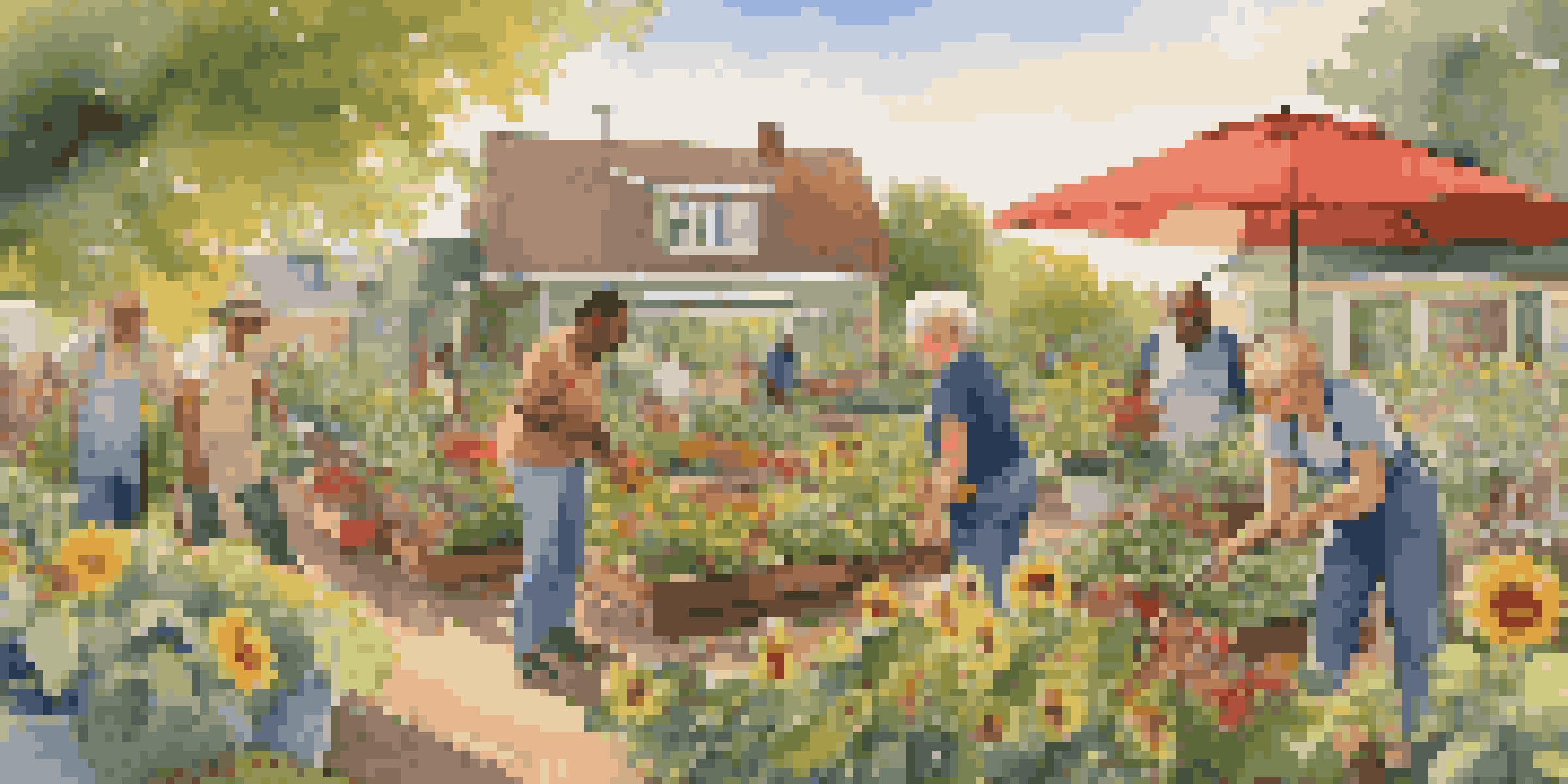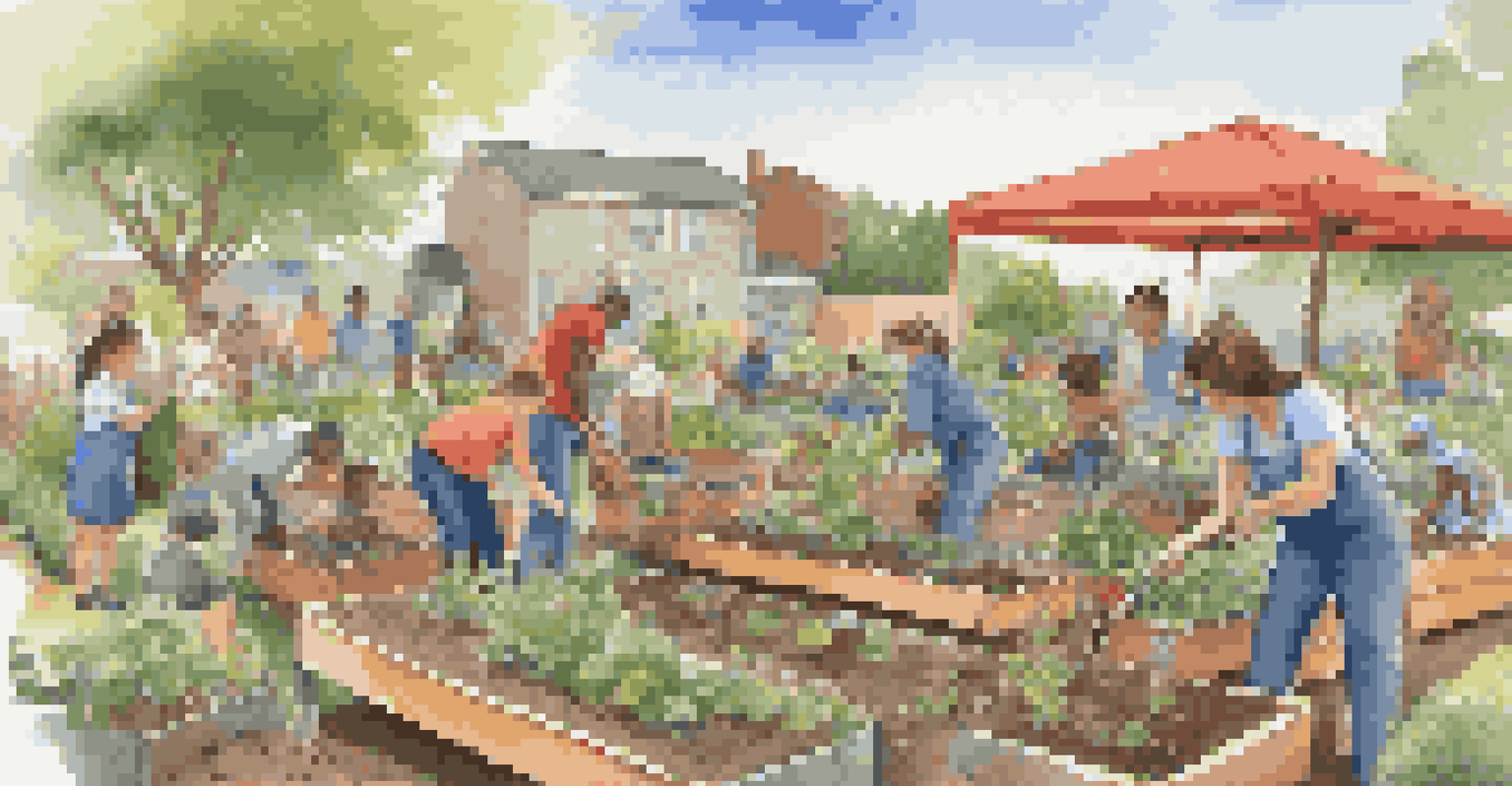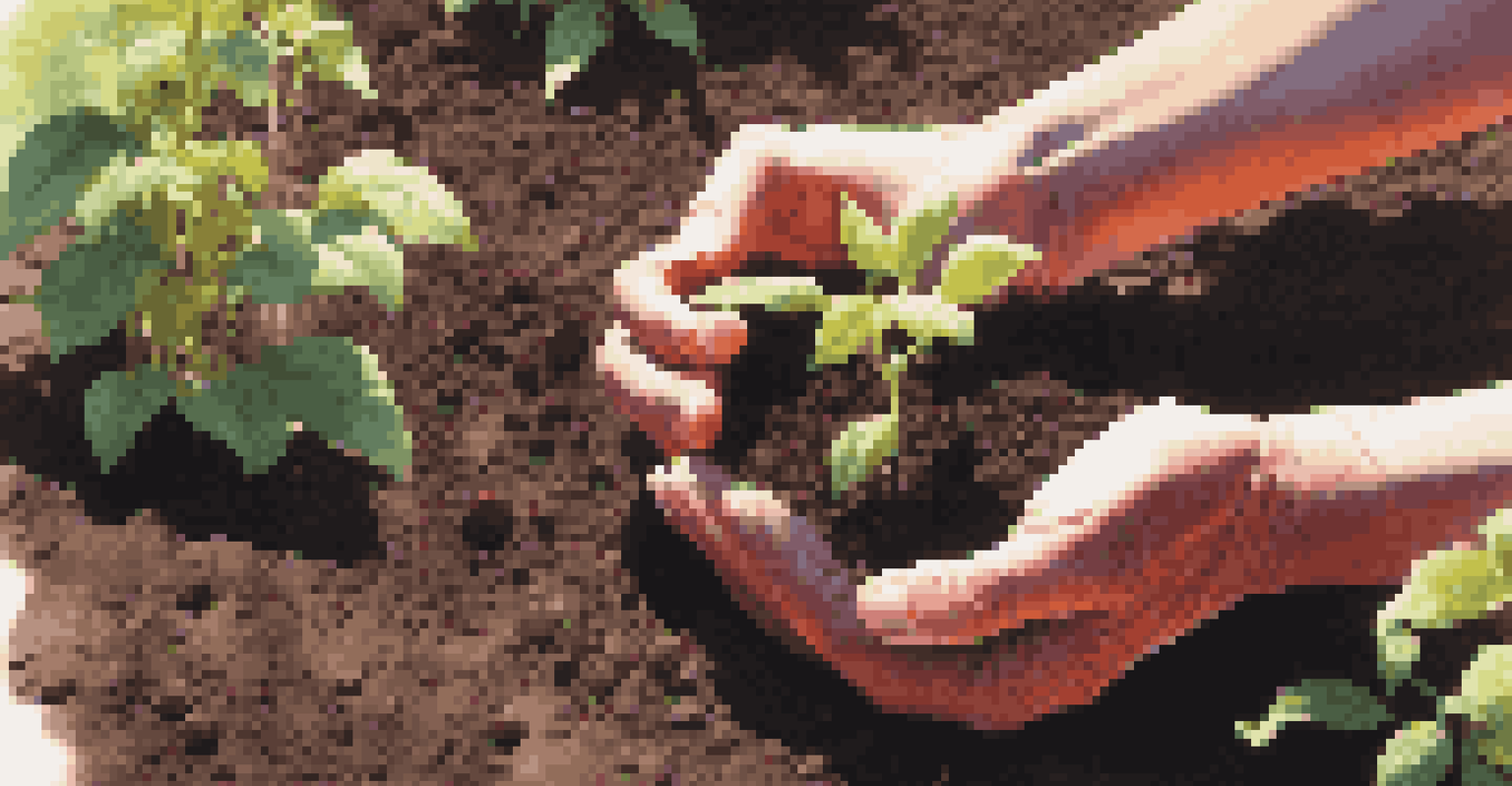Community Gardening: Fostering Social Ties and Health Benefits

What is Community Gardening and Why Does it Matter?
Community gardening involves groups of people coming together to cultivate a shared plot of land. This practice not only allows individuals to grow fresh produce but also fosters a sense of belonging and purpose within the community. It’s a simple yet powerful way to connect with others while nurturing the earth.
To plant a garden is to believe in tomorrow.
In an era where urbanization often isolates us, community gardens serve as green oases that encourage social interaction. They create opportunities for neighbors to meet, share knowledge, and work collaboratively. This communal effort not only beautifies neighborhoods but also strengthens social ties.
Ultimately, community gardening matters because it goes beyond just growing food; it cultivates relationships. By coming together to tend to a garden, participants build friendships, develop teamwork skills, and create lasting memories, making their communities more vibrant.
Health Benefits of Community Gardening: More than Just Food
Engaging in community gardening offers numerous health benefits that go beyond the fresh produce harvested. The physical activity involved in planting, weeding, and watering helps improve cardiovascular health and promotes fitness. It's a fantastic way to incorporate exercise into your routine without it feeling like a chore.

Moreover, gardening has been proven to reduce stress and enhance mental well-being. The act of nurturing plants can be incredibly therapeutic, providing a break from the hustle and bustle of daily life. Studies have shown that spending time in nature can decrease anxiety and improve mood, making community gardens a natural remedy for many.
Additionally, the nutritional benefits of growing your own food cannot be overstated. Community gardening enables participants to access fresh, organic produce, which can lead to healthier eating habits. By growing their own fruits and vegetables, individuals can take pride in their food choices and enjoy meals that are both delicious and nutritious.
Building Social Connections Through Gardening
One of the most enriching aspects of community gardening is the opportunity to build social connections. Participants often come from diverse backgrounds, bringing different cultures, traditions, and gardening practices to the table. This diversity fosters a rich exchange of ideas and experiences that can deepen friendships.
Gardening adds years to your life and life to your years.
Working side by side in the garden creates a sense of camaraderie that can be hard to replicate in other settings. Whether it's sharing tips on pest control or swapping recipes, these interactions nurture relationships that extend beyond the garden. Over time, these bonds can lead to a more supportive and connected community.
Moreover, community gardens often host events, workshops, and harvest festivals, which further strengthen these social ties. These gatherings not only celebrate the produce grown but also serve as a platform for participants to share their stories and forge lasting friendships, enriching the social fabric of the neighborhood.
Environmental Benefits of Community Gardening
Community gardens play a crucial role in enhancing local ecosystems. They provide habitats for various species, including pollinators like bees and butterflies, which are essential for a healthy environment. By encouraging biodiversity, these gardens contribute to a more sustainable community.
Additionally, gardens help combat urban heat by providing shade and cooling the surrounding area. The greenery absorbs carbon dioxide, improving air quality and making urban spaces more livable. This environmental impact is especially significant in densely populated cities, where green spaces are often limited.
Furthermore, community gardening promotes sustainable practices, such as composting and organic gardening techniques. By educating participants on eco-friendly methods, these gardens empower individuals to make environmentally conscious choices that benefit both their health and the planet.
Educational Opportunities in Community Gardens
Community gardens serve as excellent platforms for education, especially for children and families. Gardening workshops can teach participants about plant biology, nutrition, and sustainable practices, creating a hands-on learning experience. This knowledge can inspire a new generation of environmentally conscious individuals.
Moreover, these gardens can provide vital skills that extend beyond horticulture. Participants often gain valuable lessons in teamwork, responsibility, and resource management. These skills are transferable to many aspects of life, fostering personal growth and development.
Many community gardens partner with local schools to create educational programs that encourage students to get involved. Such initiatives can spark interest in science and healthy living, demonstrating the connection between growing food and making healthier lifestyle choices.
Overcoming Challenges in Community Gardening
While community gardening offers various benefits, it’s not without its challenges. Issues like limited funding, access to land, and varying levels of gardening expertise can hinder progress. However, many communities have found creative solutions to overcome these obstacles.
Building strong partnerships with local organizations and businesses can provide much-needed resources. Grants, sponsorships, and donations can help secure funding for tools, seeds, and educational programs. By pooling resources and knowledge, communities can create thriving gardens that serve everyone.
Additionally, fostering a culture of inclusivity and learning can address skill gaps among participants. Organizing mentorship programs where experienced gardeners guide novices can help everyone feel empowered and engaged. This collaborative spirit ensures that all voices are heard, leading to a more successful and enjoyable gardening experience.
Getting Started with Community Gardening
If you’re interested in starting a community garden in your area, the first step is to gather like-minded individuals. Forming a group of interested participants can help in brainstorming ideas, planning, and organizing the garden. It’s important to establish a shared vision and set goals for what you want to achieve together.
Next, securing a suitable location is crucial. Look for vacant lots, parks, or other available spaces that can be transformed into a garden. Engaging with local authorities can help navigate any regulations or requirements that may be in place for using public land.

Lastly, don’t forget to involve the community throughout the process. Hosting informational meetings, workshops, and volunteer days can help build excitement and engagement. By creating an inclusive atmosphere, you’ll ensure that your community garden thrives and becomes a beloved gathering space for years to come.